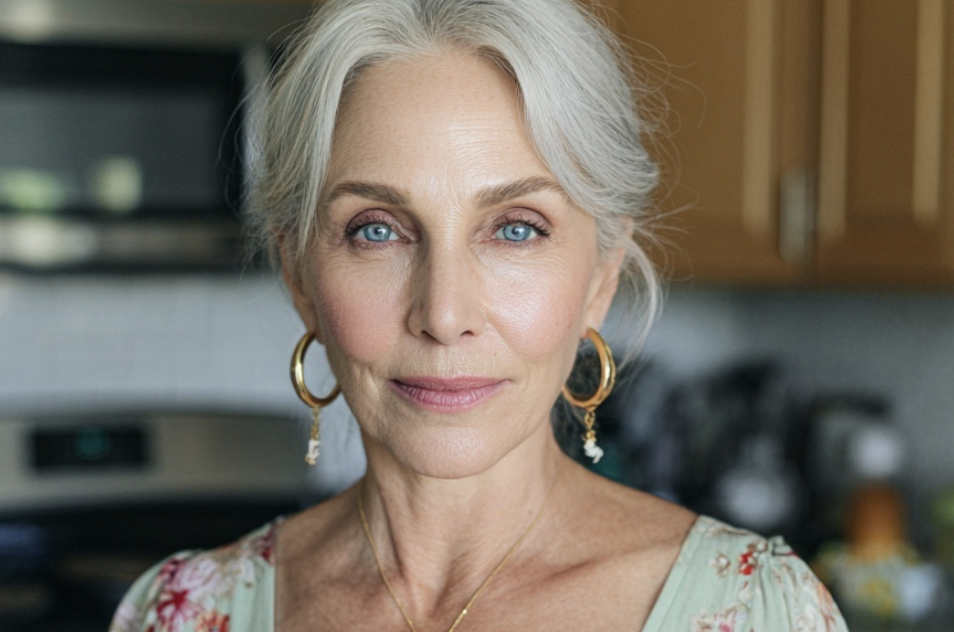The dinner plate flew into the trash can.
The sharp clink of porcelain against plastic made me flinch.
“Even the dog won’t eat your cutlets,” my husband laughed, pointing at the dog, who had deliberately turned away from the piece offered to him.
Dmitry wiped his hands on the expensive kitchen towel I had bought to match the new furniture.
He was always obsessed with details—if they were about his image.
“Anya, I told you—no homemade cooking when I’m expecting partners. It’s unsophisticated. It smells… poor.”
He said the last word with such disgust, as if it left a rotting taste in his mouth.
I looked at him—his perfectly pressed shirt, the expensive watch he never took off, even at home.
And for the first time in many years, I felt neither hurt nor the urge to explain myself.
Only cold. Piercing, crystal cold.
“They’ll be here in an hour,” he continued, not noticing my state. “Order steaks from Grand Royal. And salad—the seafood one. And do something with yourself. Wear that blue dress.”
He gave me a quick, assessing glance.
“And put your hair up. This hairstyle makes you look cheap.”
I nodded silently. Just a mechanical up-and-down of my head.
While he spoke on the phone, giving instructions to his assistant, I slowly gathered the shards of the plate.
Each shard was as sharp as his words. I didn’t argue. What was the point?
All my attempts to “be better for him” always ended the same way—with humiliation.
My sommelier courses he had mocked as “a hobby group for bored housewives.”
My attempts at decorating our home—“tasteless.”
My cooking, into which I poured not only effort but my last hope for warmth, went straight into the trash.
“And get some good wine,” Dima was saying into the phone. “Not the stuff Anya tried in her little classes. Real wine.”
I got up from the floor, threw away the shards, and looked at my reflection in the dark oven door.
A tired woman with extinguished eyes.
A woman who had spent too long trying to become a convenient piece of interior decor.
I went to the bedroom.
But not for the blue dress.
I opened the closet and pulled out a travel bag.
He called two hours later, when I was already settling into a cheap hotel on the outskirts of the city. I had deliberately avoided staying with friends so he couldn’t find me right away.
“Where are you?” His voice was calm, but in that calm was a threat. The way a surgeon looks at a tumor before cutting it out. “The guests are here, and the hostess isn’t. That’s not good.”
“I’m not coming, Dima.”
“What do you mean, ‘not coming’? Are you sulking over the cutlets? Anya, don’t be childish. Come back.”
He wasn’t asking. He was ordering—sure that his word was law.
“I’m filing for divorce.”
Silence on the other end. I could hear faint music and clinking glasses in the background. His evening was continuing.
“I see,” he finally said with an icy chuckle. “Trying to show some backbone. Fine. Play at being independent. Let’s see how long you last. Three days?”
He hung up. He didn’t believe me.
To him, I was just an object that had temporarily stopped working.
Our next meeting was a week later in the conference room of his office.
He sat at the head of a long table, next to him a slick-looking lawyer with the face of a card shark.
I came alone. On purpose.
“So, had your fun?” Dima smiled his trademark condescending smile. “I’m ready to forgive you—if you apologize for this little circus.”
Without a word, I placed the divorce papers on the table.
His smile faded. He nodded to his lawyer.
“My client,” the lawyer began in a smooth voice, “is prepared to be generous, considering your… let’s say, unstable emotional state and the fact that you have no income.”
He slid a folder toward me.
“Dmitry will let you keep your car. And he’s willing to pay you alimony for six months. The sum is more than generous, believe me—enough to rent modest housing and find work.”
I opened the folder.
The sum was insulting—not even crumbs from his table, but dust under it.
“The apartment, of course, stays with Dmitry,” the lawyer continued. “It was purchased before the marriage.”
The business was also his.
In legal terms, there was almost nothing we had acquired together. I “hadn’t worked.”
“I kept the house,” I said quietly but firmly. “I created the comfort he came home to. I organized his dinners that helped him close deals.”
Dmitry snorted.
“Comfort? Dinners? Anya, don’t make me laugh. Any housekeeper could’ve done better—and cheaper. You were just… a pretty accessory. And lately, not even that.”
He wanted to wound me. And he did—but not in the way he expected.
Instead of tears, anger boiled inside me.
“I’m not signing this,” I pushed the folder away.
“You don’t understand,” Dima leaned forward, eyes narrowing. “This isn’t a proposal.”
It was an ultimatum.
Either I took it and left quietly—or I got nothing.
He had the best lawyers, and they’d prove I had simply lived off him. Like a parasite.
He savored that word.
“Without me, you’re nothing. Nobody. You can’t even fry a decent cutlet. What kind of opponent could you be in court?”
I raised my eyes to his. And for the first time in a long time, I looked at him not as a wife—but as a stranger.
And I saw not a strong man, but a frightened, narcissistic boy terrified of losing control.
“We’ll see each other in court, Dima. And yes, I won’t be coming alone.”
I stood and walked toward the door, feeling his burning, hateful gaze on my back.
The door closed behind me, severing the past.
I knew he wouldn’t let it go—he’d try to destroy me.
But for the first time in my life, I was ready.
The trial was quick and humiliating.
Dmitry’s lawyers painted me as an infantile freeloader who decided to “take revenge” over a ruined dinner.
My lawyer, an older, unshakably calm woman, didn’t argue. She simply and methodically presented receipts and statements.
Receipts for groceries for those very “unsophisticated” dinners.
Dry-cleaning bills for Dmitry’s suits before every important meeting.
Tickets I paid for to events where he made valuable connections.
It was painstaking, unglamorous work—not to prove my contribution to the business, but to prove that I wasn’t a parasite. I was an unpaid employee.
In the end, I won a little more than he had offered, though far less than I deserved.
But it wasn’t about the money.
The point was—I hadn’t let him trample me.
The first months were the hardest.
I rented a tiny attic studio in an old building.
Money was tight. But for the first time in ten years, I fell asleep without fearing the next morning’s humiliation.
The idea came suddenly.
One evening, cooking dinner for myself, I realized I was enjoying it.
I remembered his words: “It smells poor.”
What if poverty could smell expensive?
I began experimenting—taking simple ingredients and turning them into something refined.
I remade those same cutlets from three types of meat with a wild berry sauce.
I developed recipes for complex dishes that could be cooked at home in twenty minutes.
Restaurant-quality meals in semi-prepared form—for people with no time but good taste.
I called my project Dinner by Anna.
I created a simple social media page and started posting photos. At first, orders were scarce.
Then word of mouth kicked in.
The turning point came when Larisa, the wife of one of Dmitry’s former partners, wrote to me.
She had been at that ruined dinner.
“Anya, I remember how Dima humiliated you that night. Can I try your famous cutlets?”
She didn’t just try them—she posted a glowing review on her popular blog. Orders poured in.
Six months later, I was renting a small workshop and had two assistants.
My “home haute cuisine” concept hit a trend.
Then big players reached out—a major retail chain looking for a new supplier for their premium line.
My presentation was flawless.
I spoke about flavor, quality, and saving time for successful people.
I wasn’t selling food—I was selling a lifestyle.
When they asked about the price, I named a figure that made my breath catch.
They agreed without bargaining.
Around that time, I heard from mutual acquaintances about Dmitry.
His overconfidence had backfired—he had invested all his money, including loans, into a risky overseas construction project, sure he’d strike it rich.
But his partners—those same steak-eating partners—dropped him after the divorce scandal, considering him unreliable.
The whole scheme collapsed, burying Dima under debts.
First he sold the business to pay the most impatient creditors.
Then the car.
Finally, the apartment—the fortress he thought was unshakable.
He ended up on the street, drowning in debt.
Part of my retail contract included a charity program.
I had to choose a foundation to sponsor publicly.
I chose the city soup kitchen for the homeless and needy.
Not for PR—for myself.
It mattered.
One day, I came there unannounced, in simple clothes, and joined the volunteers at the serving line.
I wanted to see it from the inside—the smell of boiled cabbage and cheap bread, the tired, indifferent faces in line, the low hum of voices.
I worked mechanically, ladling buckwheat and stew.
And then I froze.
He was there.
Gaunt, unshaven, wearing someone else’s oversized jacket.
He stared at the floor, avoiding everyone’s eyes, terrified of being recognized.
The line moved. Soon he was in front of me.
He held out his plastic plate without lifting his head.
“Hello,” I said quietly.
He flinched. Slowly, with enormous effort, he raised his eyes.
I saw disbelief, shock, horror, and finally, crushing shame flash across them.
He opened his mouth to speak, but no sound came out.
I took the ladle and placed two large, golden cutlets on his plate—the very same ones.
My signature recipe, made especially for this soup kitchen—so that people who had lost everything could at least feel human at dinner.
He looked from me to the food, to the cutlets that once he had thrown in the trash with a laugh.
I said nothing. No reproach. No gloating.
Just looked at him calmly.
Almost indifferently.
All the pain and resentment that had burned in me for years was gone—burned to ash, leaving only a cold, even calm.
He took the plate in silence and hunched even lower, shuffling to a far table.
I watched him go.
I felt no triumph, no sweet revenge—just a strange, hollow sense of closure.
The circle was complete.
The story was over.
And in that quiet, cabbage-scented soup kitchen, I understood—
The real winner is not the one still standing, but the one who finds the strength to rise after being trampled into the dirt—
and feed the one who did it.



